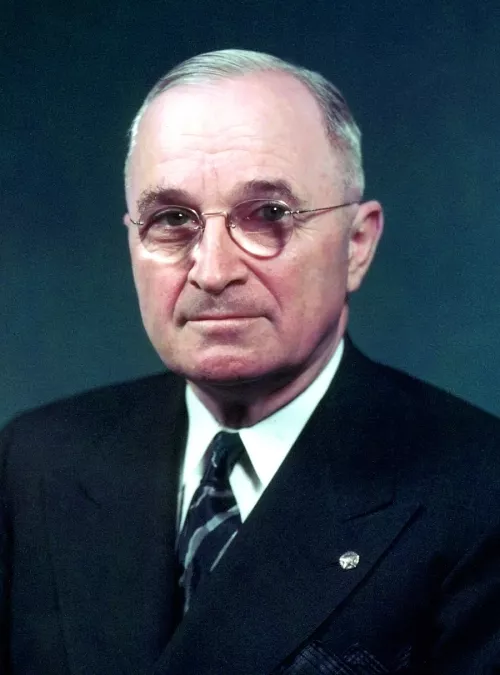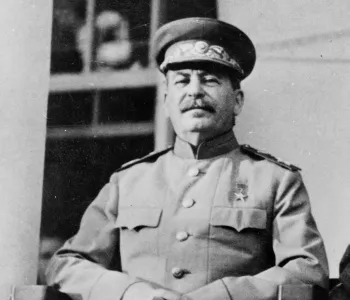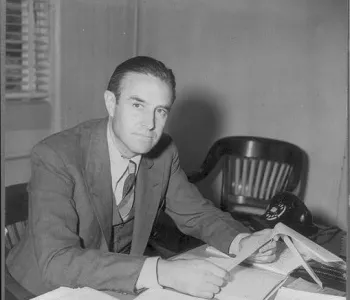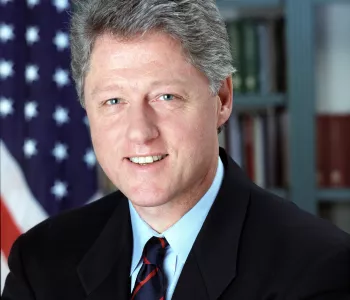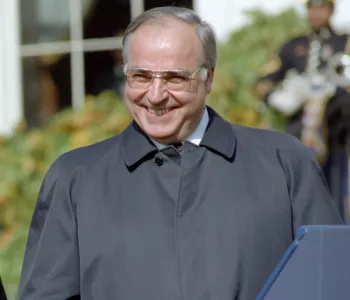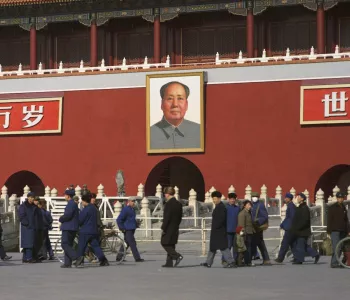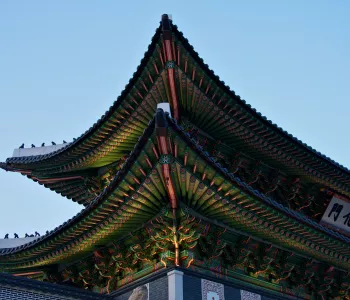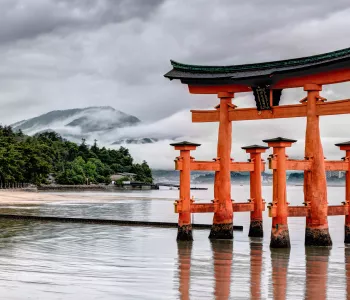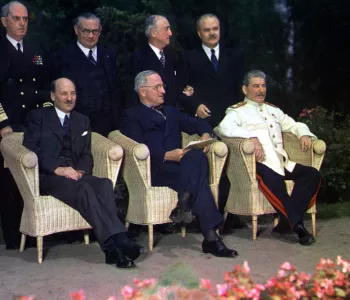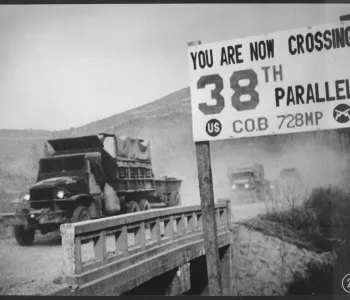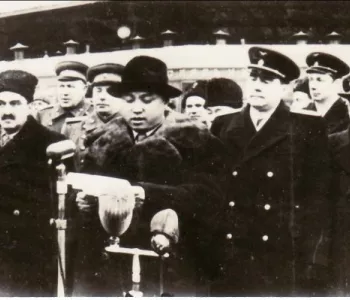"The Buck Stops Here," "Plain speaker," "Give 'em hell" -- all conjure up images of Harry S. Truman, the U.S. president remembered for his doctrine of communist containment -- as well as his decision to end World War II by unleashing the atom bomb on Japan.
Born on a farm near Lamar, Missouri, on May 8, 1884, Truman graduated from high school in 1901 and held a variety of jobs before fighting in France as a lieutenant in the National Guard.
After the war, he and a friend opened a haberdashery store, but the economy was bad and the business failed. At age 38, with the help of Kansas City political boss Thomas J. Pendergast, Truman won a country judgeship. Truman attended law school at nights, lost re-election in 1924 and was elected to another term in 1926. In 1934, with Pendergast's help, he was elected to the Senate and was branded a "Pendergast" senator upon his arrival in Washington. He was a reliable "New Dealer." His hard work, diligence and fairness to all earned the respect of his colleagues. In his second term, which he won without the help of Pendergast, he enhanced his reputation by chairing the Special Committee Investigating National Defense, exposing graft, waste and corruption and saving the United States much money.
In 1944, Truman became the vice presidential nominee on the Democratic ticket. Only a few months after coming to office, however, President Franklin D. Roosevelt died (April 12, 1945) and Truman was sworn into office having only met with the president twice since their election. He was virtually unbriefed in world affairs. Less than two weeks after taking office, Truman finalized the arrangements for the U.N. charter-writing meeting in San Francisco.
After Germany surrendered to the Allies on May 7, Truman attended his only Allied conference in Potsdam (July 17-August 2), where he met with Stalin, Churchill and new British Prime Minister Clement Attlee to help shape the world -- though much was left undecided. While in Potsdam, he learned of the success of the atomic test at Los Alamos, New Mexico. Less than three months after taking office he authorized the use of the atomic bomb, first on Hiroshima on August 6, and then, three days later, on Nagasaki. Japan officially surrendered on September 2.
After World War II, signs of increasingly troubled relations between the United States and the Soviet Union became evident. The inability of the two countries to reach agreement on key postwar issues and the growing wariness of his advisers contributed to Truman's hardening stance toward the Soviets. On March 12, 1947, Truman proclaimed that "it must be the policy of the United States to support free peoples who are resisting attempted subjugation by armed minorities or outside pressures" and proceeded to request $400 million to help fight communist insurgents in Greece and Turkey. In June 1947, Secretary of State George F. Marshall offered U.S. economic aid to European countries to help stave off hunger and desperation, which the Truman administration believed provided the breeding grounds for nascent communist movements. Four months later, State Department official George F. Kennan's "Mr. X" article, which urged containment of the Soviets, appeared in Foreign Affairs. Truman stumped the country and lobbied Congress to approve the Marshall Plan. Thus in several ways he attempted to "contain" communism.
Domestically Truman worked for civil rights legislation and reformed the foreign affairs apparatus. The Foreign Service Act of 1946 professionalized the Foreign Service. The National Security Act of 1947 created the CIA, the National Security Council and the present-day Defense Department, with civilian control over the military.
Re-elected in 1948, Truman continued to press domestically for civil rights and to contain communism abroad. He signed off on the creation of the North Atlantic Treaty Organization in 1949 and the Paris and Bonn conventions, which helped bring West Germany into the allied camp under the aegis of the European Defense Community.
In Asia, however, Truman's policies were less successful. He was unable to assure the success of the Nationalists over the communists in the conclusion of the Chinese civil war. Then, on June 25, 1950, the communist North Korean army invaded South Korea. Two days later, Truman committed U.S. armed forces under the leadership of Gen. Douglas MacArthur. Truman later fired MacArthur for publicly challenging Truman's orders, thereby asserting the primacy of civilian control over the military.
In 1952, Truman announced he would not seek a third term. He returned to private life, wrote his memoirs and built his presidential library. He died at age 88 on December 26, 1972, and was buried in the courtyard of his library in Independence, Missouri.
